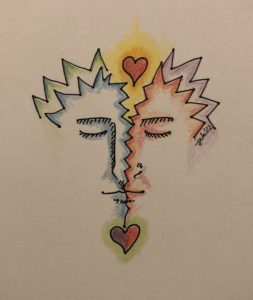
– Artwork © 2022 Jan Ketchel
In 1952, Carl Jung published an extremely provocative book entitled Answer to Job. I was drawn to read it this past week and find I must write my own provocative blog, based upon its insights, as they reflect upon the world stage of now.
I, like Jung, seek refuge from blasphemy by focusing on God as a psychological reality alone, with no comment on liturgical validity.
In a nutshell, Jung points out that for all of God’s omniscience—all knowingness—and omnipotence—all powerfulness—he mercilessly and even immorally tortured Job, his most faithful of servants, this all based upon a dare from his son, Satan.
Jung points out that at this pre-Christian stage of religious history it was evident that God blatantly expressed the full bipolar nature of his wholeness as both a loving and a vengeful God. Job, in his reaction to God’s undeserved cruelty, evidenced a moral superiority to God, as he remained completely loyal and quiet while bearing his undeserved punishment.
In effect, Job’s bearing the cross of this injustice without rageful reaction, yet with clear knowing of its undeservedness, achieved a reconciliation of emotional and cognitive opposites superior to that of God himself. Jung goes on to suggest that God actually requires human beings to struggle with these same opposites within themselves to advance His, God’s, own evolution.
Indeed, life in human form is fraught with the torment of opposites. Life is suffering states the Buddha. When Bad Things Happen to Good People writes Rabbi Kushner. The people of Ukraine are being slaughtered, like Job, for no fair reason. How can good and evil be reconciled to ensure a future for our threatened planet?
Christianity was built upon love, as in love thy neighbor as thyself. This heart-centered compassion for all beings does offer a reconciliation to the current tearing apart of life, as experienced in the extreme polarities at war in all nations of the world. However, this heart-centered solution has yet to advance.
The schism in the Christian solution of love is rooted in its splitting off, disowning, and condemning of the shadow side of self, and of God. Evil’s rightful inclusion as part of the wholeness of God, and human, is lost. This results in the projection of one’s own evil upon thy neighbor, which forestalls the commandment to love thy neighbor. This leads, as well, to the kinds of abuses resulting from the repression by the conscious personality of one’s shadow, and the subsequent possession of the personality by that shadow self.
If Jung was correct in his assessment, human salvation requires a human willingness to bear the tension of the opposites, such as is currently unleashing upon the world stage, in the disintegration of laws in such places as the United States Supreme Court, for instance, as well as in the overall governance of the world.
The fact that civilization, as we have known it, is breaking down, means that we are being called upon to reconcile the unleashed extreme opposites, which we are all composed of, in a new and durable form. Love may be the answer, but we won’t get to it through disowning our own evil side and blindly projecting it upon our neighbor.
Prayer may be helpful, but remember the challenge of Job: God required of him to find a reconciliation of love, hate, cruelty, and unfairness to provide an answer for God himself. Everyone of us is divinely challenged to take up the reconciliation of the extreme opposites inherent in our own bipolar nature, as reflected in the chaos of our time.
Bearing the cross of opposites to achieve balanced wholeness in human form is taking up the work of God’s karma. Assuming full responsibility for the life we are in is the only path to survival and sustainable evolution.
In pragmatic terms, we must begin by accepting, without blame or resentment, that life is unfair. Actually, this, in itself, is the outcome of a transformative process, which requires that we first allow ourselves to accept and express, in some form, the “evil” of our intense emotional reactions to being ruthlessly offended.
We are then freed to bear the tension of our unfair circumstances as we move beyond the entrapments of resentment and self-pity. From the groundedness of this acceptance we find our way to the equanimity that values all circumstances equally. From this place, we are emotionally refined and able to find our way to the love and transcendence available at the heart of our being.
Love does offer the breadth of acceptance that owns and reconciles the truth of our bipolar nature. To travel this human path is indeed a genuine resolution of the the divine conflict of now.
Assuming responsibility to love,
Chuck
